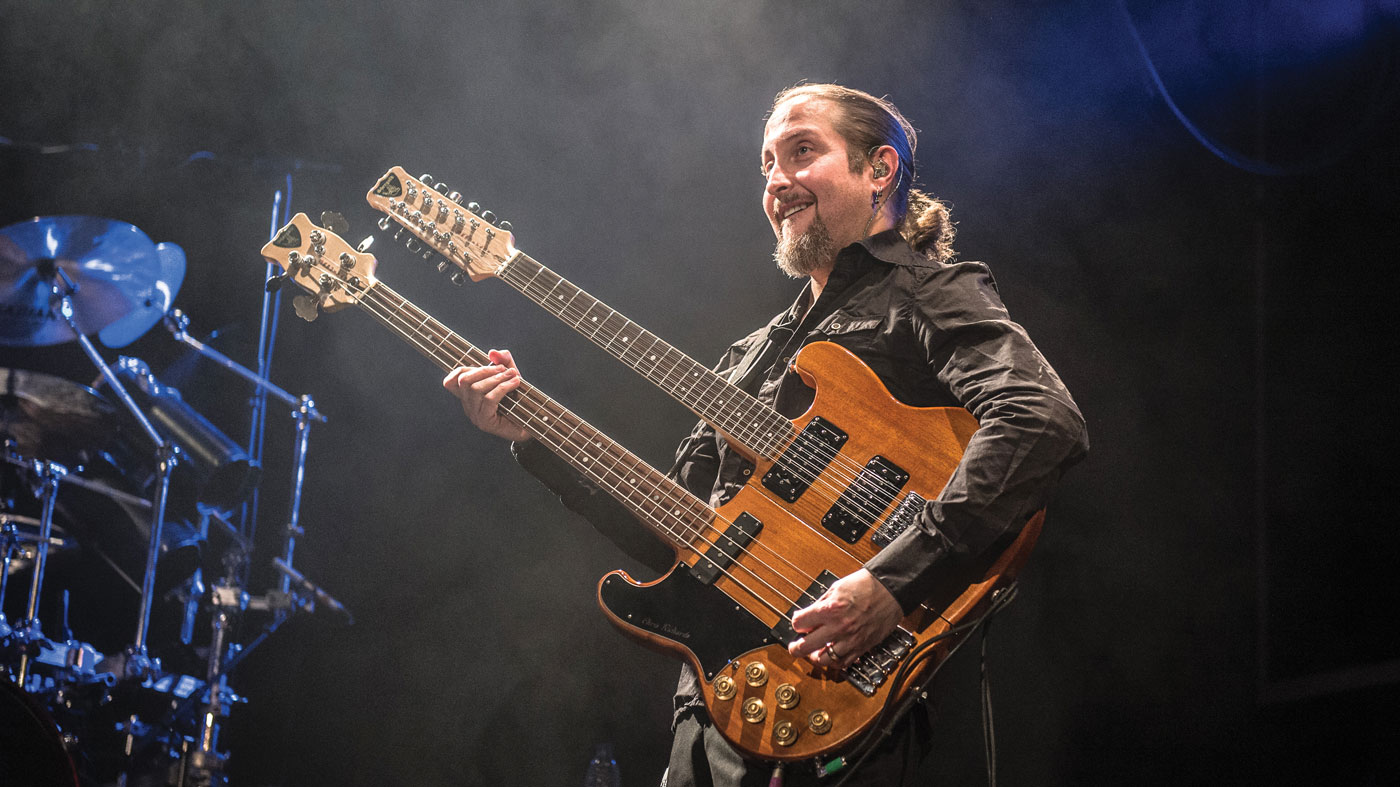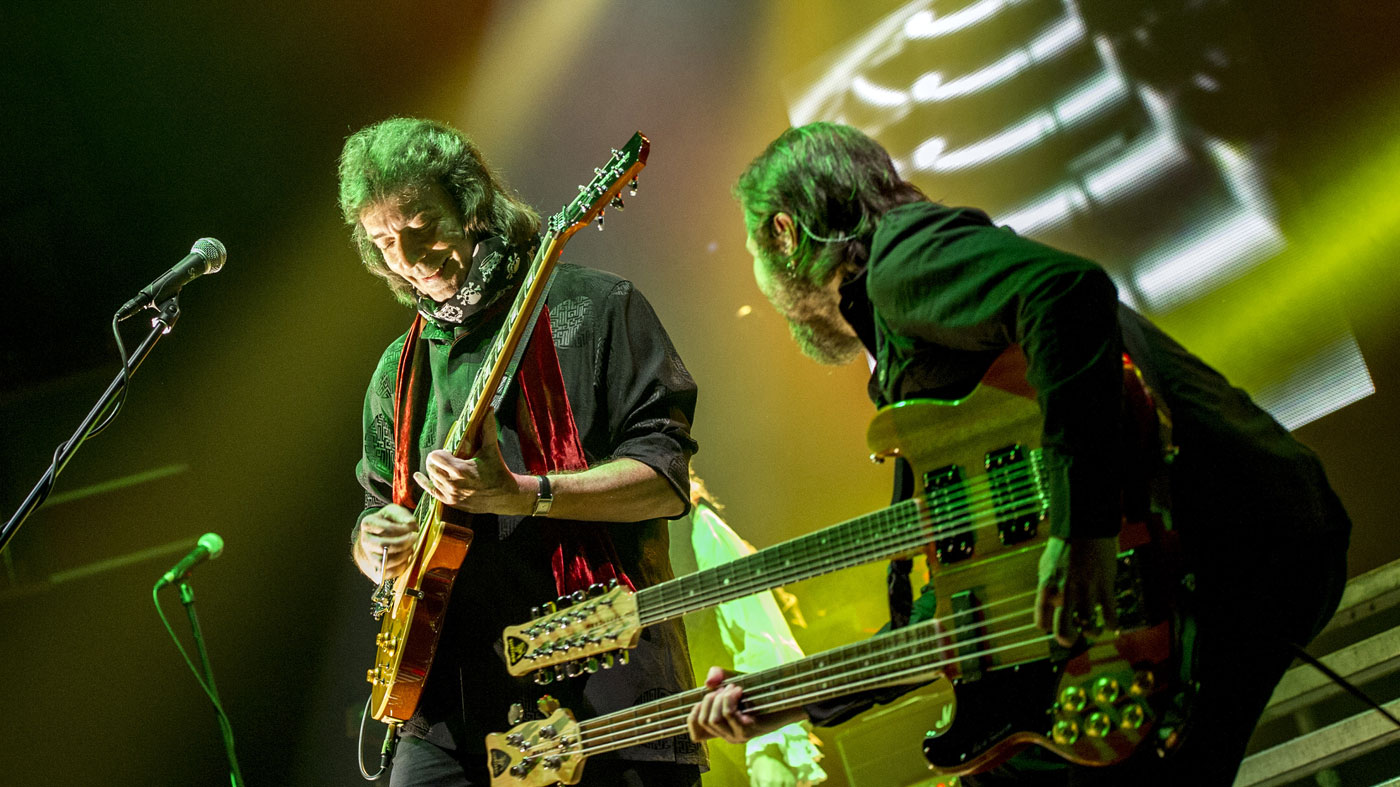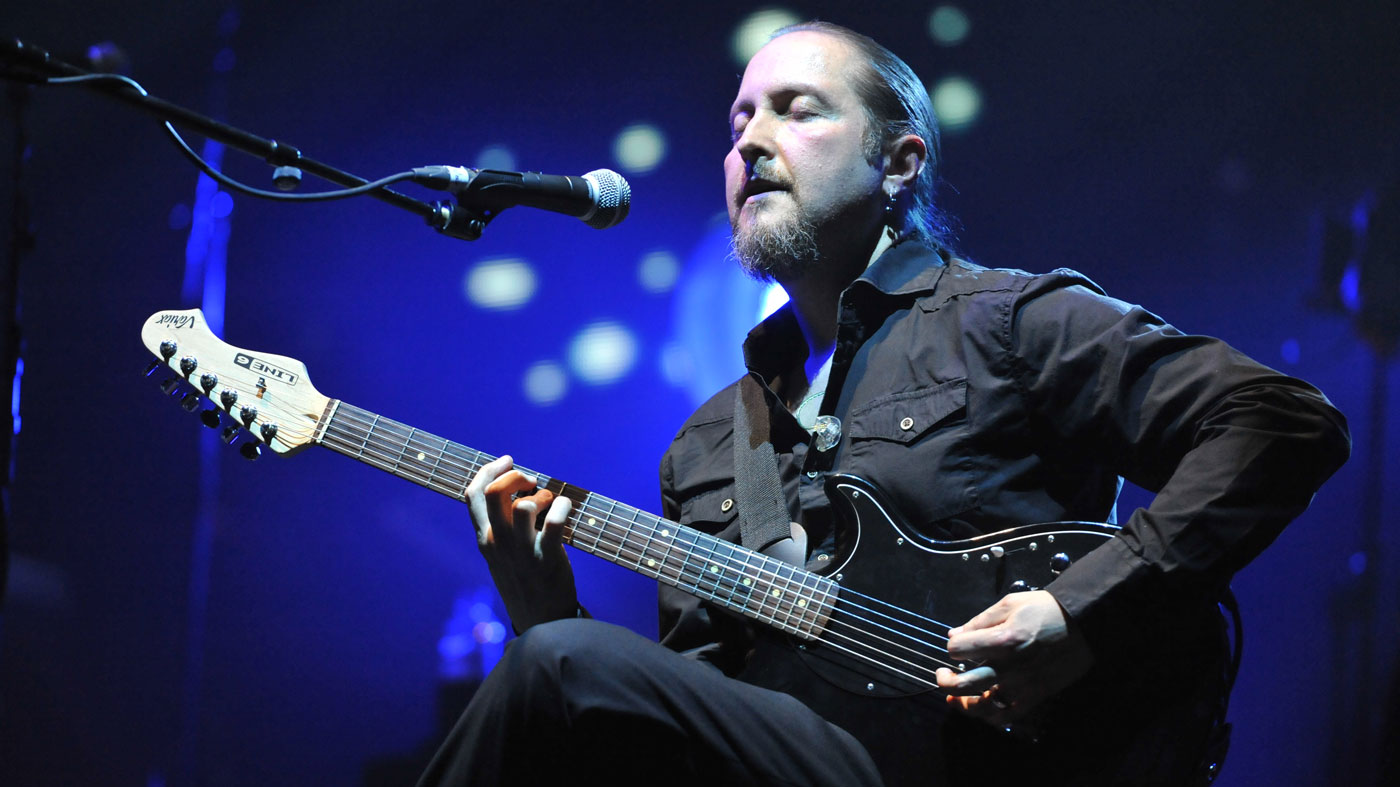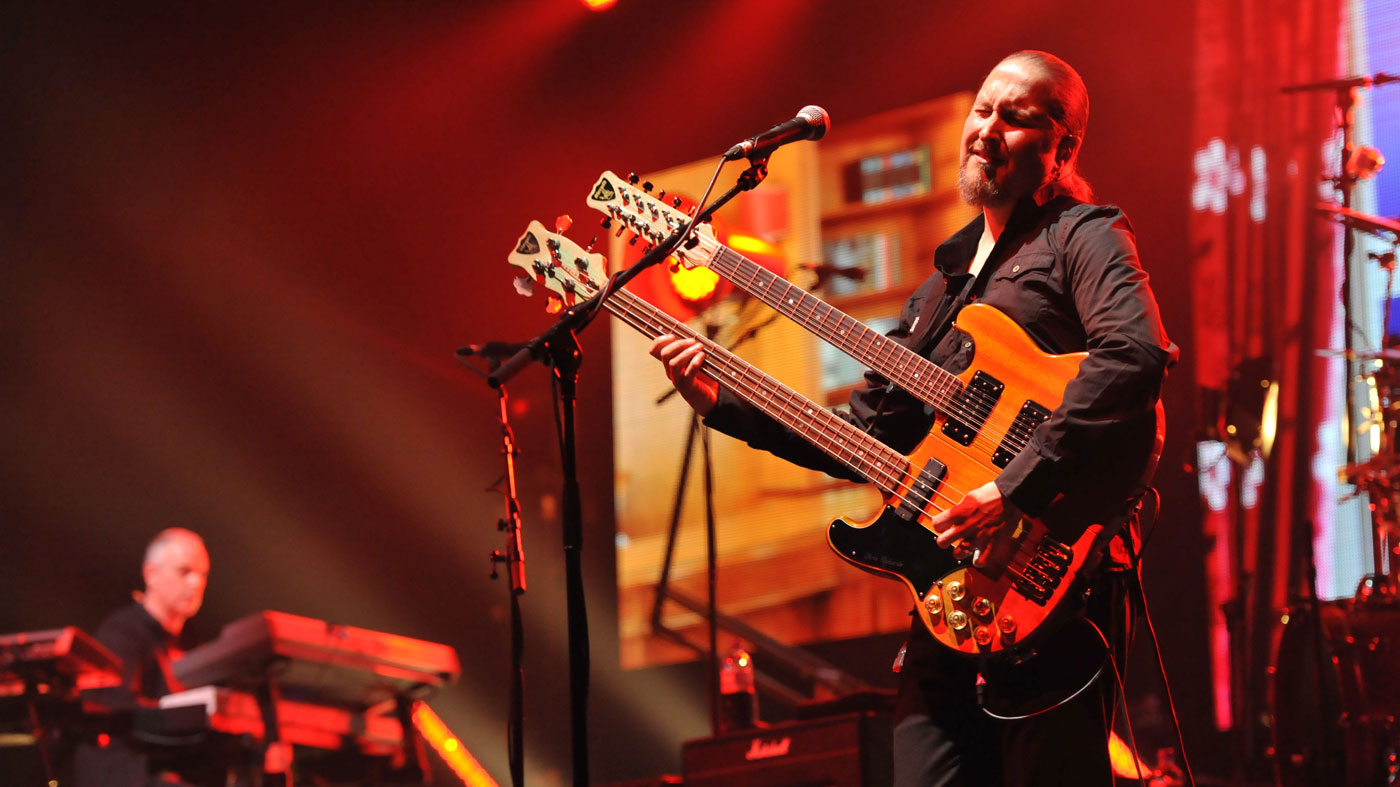Lee Pomeroy: "To play these songs with Jon Anderson and Trevor Rabin is a dream come true"
The busy bassist on touring with Yes, ELO and Take That

Yes. ELO. Take That... how many other bassists can you name who play in not one but three massive bands? Joel McIver meets the mighty Lee Pomeroy
‘Prog’ and ‘pop’ may be only two letters apart, but there’s a world of difference between the two styles of music - unless you’re a bass player. Ask Lee Pomeroy, a veteran of a whole list of bands, from his two main gigs with ELO and Take That, to his work in Yes, to his own band Headspace, how his attitude differs from one set to the next - and you may be surprised at his answer. Behold the wisdom of the busiest man in bass...
You’re a busy man to say the least, Lee.
Chris Squire was the first bass player whose work I really sat down and listened to
“Mate, it’s brilliant. I’m having an absolute ball, I have to say. I've got a packed schedule with Take That and ELO, and then there's Yes on top of that. It’s full on! Over the last four years I’ve been out of the UK more often than I’ve been in it. I used to absolutely love the lifestyle - and don’t get me wrong, I still have a great time - but I'm a bit knackered.”
A bit too much waiting around in airports?
“There comes a point, as you get a bit older, when you realise that you miss your slippers, haha! I miss my family as well, so I could do with a year when it’s not quite so full on. Of course, as a professional musician you never want to say no to work, because you don’t know when the next time you’ll get a chance to say yes is going to be.”
Playing in huge venues with legendary bands is the upside, presumably?
Want all the hottest music and gear news, reviews, deals, features and more, direct to your inbox? Sign up here.
“Absolutely. I’m not complaining about it - it’s great. Chris Squire of Yes was always my biggest hero, and to be able to play these songs with Jon Anderson and Trevor Rabin is a dream come true. He was the first bass player whose work I really sat down and listened to. Roundabout and Heart Of The Sunrise are the first two bass-lines I ever learned.”
How did you get into progressive rock?
“I’ve got two older brothers, and they were always playing all sorts of interesting music. They’d listen to Bob Marley, Stevie Wonder, Bebop Deluxe, Genesis, Yes… all different kinds of music. I’d be in bed trying to go to sleep, because I had school the next morning, but I could hear it coming from the next room. It really wedged itself into my brain. If you slice me in two, I’m prog all the way through.”

Fractal and Fragile
How did you get into playing bass?
“My brother had a bass guitar, and I used to pick it up and have a thrash around on it when he was at work. I remember thinking, ‘Where’s that Yes record that he keeps playing?’ and putting [the 1971 album] The Fragile on. I got really into Roundabout and learned it, but - and I know this sounds weird - I didn’t actually learn it as such, because I could play the bass as soon as I picked it up. I never had to work out how to play it, or even how to hold it, even though it was upside-down because I’m left-handed.”
How do you approach Chris Squire’s bass tone?
Chris Squire would hold the pick close to the fleshy part of his thumb, so he’d get a harmonic out of every note
“You can never quite achieve Chris’s sound, because he had a unique way of playing. He used to hold the pick close to the fleshy part of his thumb, so he’d get a harmonic out of every note. His Rickenbacker was unique too, because he had it all shaved away to make it thinner than most Rickys. You can emulate a version of his tone, though, so I’m using Rickenbackers and Kemper Profilers. The Marshall Super Bass 100 amp was the mainstay of Chris’s sound, and there’s one of those in the Kemper.”
Kemper Profiler versus Fractal Axe-FX - discuss.
“The Kemper has more of the classic amp tones, as I understand it, and the way it’s laid out is more intuitive because it looks like an old amp itself. The guitarist in Headspace, Pete Rinaldi, uses a Fractal and he loves it; he wouldn’t use anything else. I bought my Kempers because I wanted great amp tones for my studio. I’m an EBS endorser, but because I knew I was going to be using a lot of effects, like Chris did, I didn’t want a huge bank of pedals. The effects in the Kemper are amazing; I use a flanger in the song Cinema, which has a really big regeneration in it so it sounds like an aeroplane landing.”
What other effects do you use in Yes?
“I use a chorus and a harmoniser on Changes, because Chris had a bass that was tuned half in octaves and half in fifths. Then I use a patch with an envelope filter on it for the solo in The Fish, and another with a chorus and a repeat echo on it, to set up one of the riffs. So there’s a lot of effects in my Yes gig, and a lot of them go out in stereo, too. The Kemper has been perfect for the gig. I saw King Crimson play a couple of years ago, and Tony Levin was using one - and I thought ‘If it’s good enough for Tony, it’s good enough for me!’”
What basses do you use?
“I take two Rickys out on the road with me, and in 2016 I took my five-string Music Man out as well. I’ve just bought an old 80s Warwick Streamer as well; I had one of those in the 90s, and I should never have sold it. I use that with a drop-D tuning in ‘Rhythm Of Love’ and ‘Owner Of A Lonely Heart’.”

Saying Yes
Who else influenced you on bass?
“One of my huge heroes is Geddy Lee; I tend to like bassists who sing. What they do appeals to me more, for some reason. Back in the 80s, Geddy used an Ashly preamp, and I’ve just bought one - for $150! It’s absolutely fantastic. Did you see Geddy play Roundabout with Yes at the Rock And Roll Hall Of Fame last year? I was there, with ELO! So I got to hang out with Geddy and [Rush guitarist] Alex Lifeson for half an hour backstage and chat. Lovely guys. I saw Geddy again later, just before he went on stage, and he’d watched ELO and said ‘My God, you guys sounded incredible’ - which, for me, was really nice because he’s one of my biggest heroes.”
I actually gave Geddy Lee a mod tip for his Fender Jazz which he didn’t know about
Talking bass with Geddy... it doesn’t get better.
“I actually gave Geddy a mod tip for his Fender Jazz which he didn’t know about. On my Jazz basses, I’ve had a 250kHz push-pull pot by DiMarzio installed, because when you pull the pot up it goes from series to parallel - in other words, you suddenly have an overall volume for the bass instead of individual volumes per pickup. That makes the sound much fatter. It’s so good that I never play my Jazz basses these days without it being in parallel, even though you lose a bit of treble. Herbie Flowers has his basses wired the same way. Geddy said he’d look into it!”
How did the Yes gig first come up?
“I knew Rick Wakeman, because I’ve been playing with him on and off for 18 years now, and I’ve always got on great with him. He knew what a massive Yes fan I am, so when this gig came up he suggested me to to the band. He knew that I knew all the bass and vocal parts, which obviously helped. Trevor didn’t know me, but he checked out some stuff I’d done with Steve Hackett from 2013, and thought I might be the right guy. I was playing a double-neck bass in the videos he saw, so he knew I was serious about prog! That was it.”
Presumably you must have to sing across the bass-lines sometimes?
“All the time. It’s like rubbing your tummy and patting your head at the same time. You tend to be more economical with your bass part when you’re singing, and then dig in with the bass when you’re not. It really helps you to understand how the bass needs to support the vocals and not just play over them.”

Awake, arise
What’s the most challenging bass part in the Yes set?
“The song Awaken is 23 minutes long when we play it live, and the main body of the track is in 11/8, so the riff I play changes slightly all the time. Then the vocal, the way Jon sings it, floats over the top rather than being in a set time - and I have to harmonise with him, in time, while playing in 11/8! It’s tricky… To learn it, I sat down with my bass and a loop of the song and just kept playing and singing until I eventually got it right.”
The song Awaken is 23 minutes long when we play it live, and the main body of the track is in 11/8
After all that, can you generally handle any bass part that is required of you?
“Pretty much, yes. Having said that, if someone said to me, ‘Come on, we’re going to play some Weather Report’, I’d probably say ‘I’m not your man. You need Mohini Dey!’ She’s incredible.”
Do you enjoy slap bass?
“I can slap, but the strings are upside down so I have to approach it in a different way. In the 80s people said ‘You’ll never be able to play slap bass like that!’ so I thought ‘Oh yes I will’ and went off and learned a load of Level 42 licks. Where some people would double-thumb the E string and then pop a higher string, I slap the E string with my picking hand and ghost another note with my fretting hand.”
Technique is useful, of course, but what else do bassists need to know?
“You should always be in service of the song. The songs I play with Take That are songwriter-based, so I play very simple bass parts most of the time - but you can still play them with everything you’ve got. You can put as much determination into a single note as you can into a five-minute slap solo.”
Will you ever retire, Lee?
“No, I’ll never stop. I’ll be playing bass until they lower me into the ground.”
Even then, there’ll be the sound of distant bass coming out of the coffin...
“Yeah - the sound of me still trying to work out that 11/8 part from Awaken!”

